Our intention for Reading at Park Spring is:
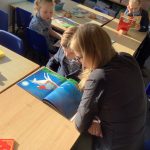
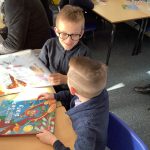
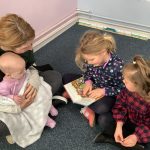
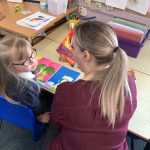
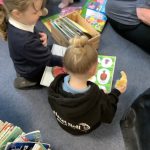
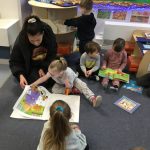
Phonics
Phonics is the foundation stone for reading and for lifelong learning. Children need to learn to read as quickly as reasonably possible, so they can move from learning to read to reading to learn.
Children in Early Years and Key Stage 1 follow the synthetic phonics approach, using the Little Wandle Letters and Sounds Programme. It’s an approach to teaching phonics in which the sounds of spoken English are matched to individual letters or groups of letters. For example, the sound f can be spelled as f, ff, or ph.
Follow the link below to watch a short video demonstrating how to correctly pronounce the sounds we teach in Reception.
In Reception and Year 1, we teach a daily phonics lesson. In Reception, we start with a 10-minute lesson, with additional daily oral blending games. This builds to the full 30-minute lesson when appropriate for the children.
We follow Little Wandle’s expectation of progress. This sets out the learning which will happen in Phase 2, 3, 4 and 5 across the Reception and Year 1 terms.
When children are in Year 2 and beyond, the focus shifts from phonics to spelling. For some individuals who are not fully fluent at reading or have not passed the Phonics Screening Check, we continue to timetable daily phonics lessons.
To watch the recording of our recent information meeting to parents regarding our new phonics scheme, please click here.
Our Glossary outlines the language that we use in school that can be used at home too.
Reading in school
In Nursery we want to encourage a love of reading by sharing stories together, using puppets/actions/songs and props to act out or retell stories. We also want children to develop an understanding of how to read books carefully: turning the pages from left to right and following the story. Careful questioning by adults helps children to make sense of what they have read and talk about their ideas. Vocabulary development is an integral part of these discussions.
Here is a video link of Mrs Ward reading the story of ‘Zog’ by Julia Donaldson. This is how we read a story book to our children for enjoyment.
In Reception and Year 1, we use a combination of books including Rising Star Rocket Phonics (that have been matched with the Little Wandle progression) and Collins Big Cat Little Wandle Letters and Sounds revised to practise phonics (and therefore practise reading). Children in Reception and Year 1 read the same book, matched to children’s phonic knowledge, at least three times across the week in school. The books are to practise the skills of reading:
In Year 2, we continue to teach reading in this way for any children who still need to practise reading with decodable books. If not, the children read books from the Rising Stars scheme that are at a higher level, once they have read these books, they move on to reading Oxford Reading Tree levelled books. We use these books for children throughout Key Stage 2. No matter where a child is on their journey of learning to read, we expect them to be able to read their levelled book with 90% fluency so that they are able to concentrate on comprehension rather than decoding.
Alongside this learning to read practice, there are plenty of opportunities to read including daily story time and daily ERIC time (Everybody Reading In Class).
We have developed an English overview for each year group to show which high quality texts are used in each half term to support the teaching of English and other subjects, the ‘class reader’ for each half term and some suggested books to read at story time by the half termly authors. See below.
Reading at home
In Nursery, we send home reading books with no words, so that the children can focus on telling the story of what is happening in the pictures, in their own words. Children also take home a library book to share together, to foster their love of reading at home. We encourage parents to ask questions about the story, to check the children have understood it, and to support their vocabulary development by giving them new words to use and modelling good sentences for them to use. By the time the children enter Reception, they will have a familiarity of sharing books at home and will have developed good reading habits that can be developed as the children learn to apply their phonic skills to reading words and simple sentences.
Here is a video link of Miss Horner reading ‘Stickman’ and Mrs Fotherby reading ‘Pants’ which are the types of stories that we would like you to share at home with your child. Please read with enthusiasm and enjoyment as the children will mirror this in their own story telling and reading.
To practise reading, in Reception and Year 1 the same practice book that’s been read in school is then available to read at home as an e-text. Because we’ve read it at least three times in school, your child should be able to read the text independently. If they’re reading it with little help, please don’t worry that it’s too easy – your child needs to develop fluency and confidence in reading.
Click on the link below to access the Collins eBook website.
Once children are not dependent on reading phonically decodable books, we send home a physical book either from the Rising Stars or Oxford Reading Tree scheme. The same rule of 90% fluency applies so your child will bring home a book where they can fluently read 9 out of 10 words approximately so that they continue to develop their fluency and confidence in reading.
Parents/carers are required and encouraged to write in their child’s reading record book so that we have communication between home and school about how their child is reading their book at home. Our expectation at Park Spring is that children in Reception read at home twice a week, in Key Stage 1 three times a week, in Years 3 and 4, 4 times a week and 5 times a week in Years 5 and 6. These reading activities can include online reading e.g. Lexia, Reading eggs or Bedrock. Click on the links below for these websites.
To develop a love of reading, your child takes home a separate book which is chosen from our class or key stage libraries. To encourage your child to become a lifelong reader, it’s important that they learn to read for pleasure. This sharing book is a book they have chosen for you to enjoy together.
We have a Park Spring ‘Reading for Pleasure’ list which lists books and stories for each year group that are age appropriate for children to either enjoy reading or be read to. They include some classic books and some more recent books by new authors that we have enjoyed in school. We have lots of these books in school but if you are looking to buy some books for your child to read at home, this will be of use.